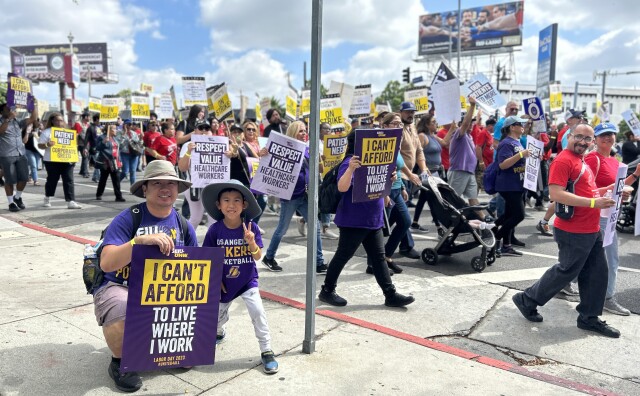In California, where large numbers of people with severe mental health challenges are living on the streets, a new bill is looking to broaden the criteria by which these individuals can be detained by the state.
If Senate Bill 43 passes, its supporters say it could prevent those in psychological distress from causing harm to themselves and others, as well as help keep them out of prison. But SB-43 has a coalition of critics, particularly among disabled and unhoused communities and human rights advocates.
A Dire Need
California State Senator Susan Talamantes Eggman, who authored SB-43, says her legislation would correct for changes made more than 50 years ago that narrowed the criteria authorizing the state to involuntarily commit people in psychological distress. That 1967 legislation, known as the Lanterman-Petris-Short Act, sought to limit inappropriate and indefinite institutionalization — but Eggman says the change in the law was not accompanied by a change in services to match the influx of struggling individuals.
“The system has failed a large segment of the population — and not only those needing help, but their families, their friends who struggle to be able to provide help for them,’” Eggman told LAist's public affairs show, AirTalk, which airs on 89.3 FM. “So that's why I think it's time for us to really face the fact that what we put into effect in 1967 does not meet the reality of what we're seeing right now in 2023.”
"It's time for us to really face the fact that what we put into effect in 1967 does not meet the reality of what we're seeing right now in 2023.”
As a former social worker, Eggman she says she always advocates for voluntary treatment first. But many people are in grave need, she says. More people are being hit by cars. They might have untreated abscesses, addictions, or sexually transmitted diseases. They might be unaware of their surroundings — or of the urgency of their situations.
Eggman says this bill would allow the state to support those who are currently unable to make decisions to prevent their conditions from deteriorating to the point where they might cause harm or commit a crime.
“The goal is to get people as independent as they possibly can be,” Eggman says. “So while people may end up in a locked facility, we hope that would be for a very short time and then [they would] be able to move back down into the continuum of care that we're really hoping to build out.”
This “continuum of care” includes access to affordable housing and behavioral health initiatives starting from youth. During the pandemic, Eggman says, California allocated over 12 billion dollars to improving mental health support structures and increasing construction of housing.
Why some advocates say this approach disregards lived experiences
Samuel Jain, a senior attorney for Disability Rights California, says that SB-43 won’t actually provide this additional care, and that involuntary commitment will impinge on the civil rights of those with mental disabilities.
These facilities are not places of healing.
“They're a lot better than they were a hundred years ago," Jain told us, "but a lot of people still come out of these places pretty traumatized.”
Some people have stories like being restrained for long periods, and being forcibly injected with powerful medications, Jain says. That’s part of why the supporters of SB-43 are typically family members of those with severe mental illnesses, rather than those individuals themselves.
“So organizations representing individuals with lived experience unanimously oppose this bill. These are people who have mental health disabilities, people who've experienced forced treatment, who are telling us that this hasn't worked for them," Jain said. "In fact, it's pushed them away from the mental health system and discouraged them from seeking treatment.”
Lack of preventive and long-term care
Kristen R. Choi, who teaches public health and nursing at UCLA, says she has worked with thousands of people who have been put on short-term holds through the Lanterman Act as well as hundreds of people who have been placed under conservatorships, which she says are a blunt instrument — they can be lifesaving to some and deeply painful for others, and not enough care is put into identifying the best path.
“One of the big challenges that we have in California is that often this blunt tool is the only tool that we have because we have not invested in preventive services, community services, and other more precise tools that can keep people from needing involuntary care,” Choi says.
Some people might benefit from involuntary services under SB-43, Choi says, but it’s important to make sure that there are alternatives, like voluntary community-based care.
“A lot of people who we know have poor access to preventive and community-based care are the ones who are more likely to be detained on an involuntary hold,” Choi says, noting that Black people and migrant workers often lack these resources and are disproportionately likely to be detained.
And further, capacity for these services is lacking — there are not enough beds, and hospitals are “absolutely squeezed,” Choi says. This raises more questions for the long-term prospects of SB-43.
“There are a lot of questions about what resources are going to be in place to make sure that if people are put on a hold or a conservatorship is initiated, that we can provide them with the care that they deserve across the whole spectrum,” Choi says.







